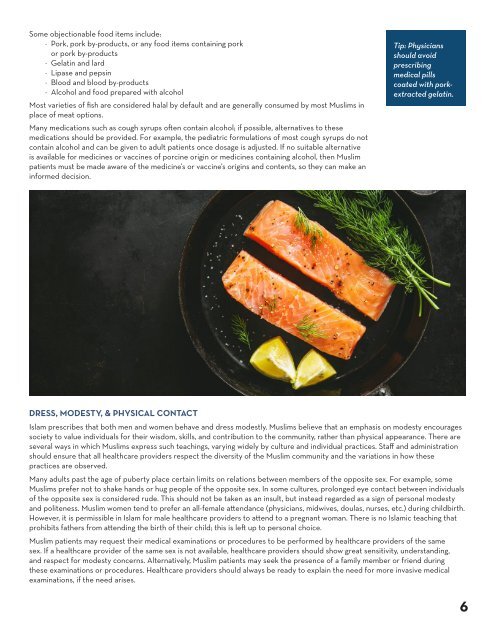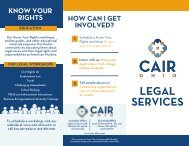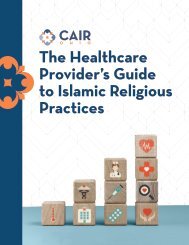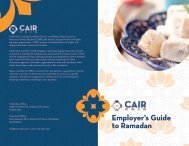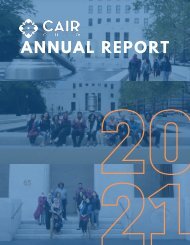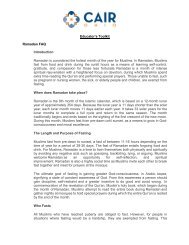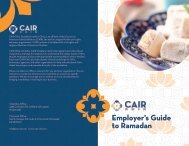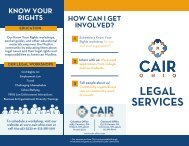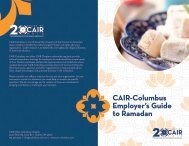CAIR-Ohio-Healthcare-Providers-Guide
You also want an ePaper? Increase the reach of your titles
YUMPU automatically turns print PDFs into web optimized ePapers that Google loves.
Some objectionable food items include:<br />
− Pork, pork by-products, or any food items containing pork<br />
or pork by-products<br />
− Gelatin and lard<br />
− Lipase and pepsin<br />
− Blood and blood by-products<br />
− Alcohol and food prepared with alcohol<br />
Most varieties of fish are considered halal by default and are generally consumed by most Muslims in<br />
place of meat options.<br />
Many medications such as cough syrups often contain alcohol; if possible, alternatives to these<br />
medications should be provided. For example, the pediatric formulations of most cough syrups do not<br />
contain alcohol and can be given to adult patients once dosage is adjusted. If no suitable alternative<br />
is available for medicines or vaccines of porcine origin or medicines containing alcohol, then Muslim<br />
patients must be made aware of the medicine’s or vaccine’s origins and contents, so they can make an<br />
informed decision.<br />
Tip: Physicians<br />
should avoid<br />
prescribing<br />
medical pills<br />
coated with porkextracted<br />
gelatin.<br />
DRESS, MODESTY, & PHYSICAL CONTACT<br />
Islam prescribes that both men and women behave and dress modestly. Muslims believe that an emphasis on modesty encourages<br />
society to value individuals for their wisdom, skills, and contribution to the community, rather than physical appearance. There are<br />
several ways in which Muslims express such teachings, varying widely by culture and individual practices. Staff and administration<br />
should ensure that all healthcare providers respect the diversity of the Muslim community and the variations in how these<br />
practices are observed.<br />
Many adults past the age of puberty place certain limits on relations between members of the opposite sex. For example, some<br />
Muslims prefer not to shake hands or hug people of the opposite sex. In some cultures, prolonged eye contact between individuals<br />
of the opposite sex is considered rude. This should not be taken as an insult, but instead regarded as a sign of personal modesty<br />
and politeness. Muslim women tend to prefer an all-female attendance (physicians, midwives, doulas, nurses, etc.) during childbirth.<br />
However, it is permissible in Islam for male healthcare providers to attend to a pregnant woman. There is no Islamic teaching that<br />
prohibits fathers from attending the birth of their child; this is left up to personal choice.<br />
Muslim patients may request their medical examinations or procedures to be performed by healthcare providers of the same<br />
sex. If a healthcare provider of the same sex is not available, healthcare providers should show great sensitivity, understanding,<br />
and respect for modesty concerns. Alternatively, Muslim patients may seek the presence of a family member or friend during<br />
these examinations or procedures. <strong>Healthcare</strong> providers should always be ready to explain the need for more invasive medical<br />
examinations, if the need arises.<br />
6


